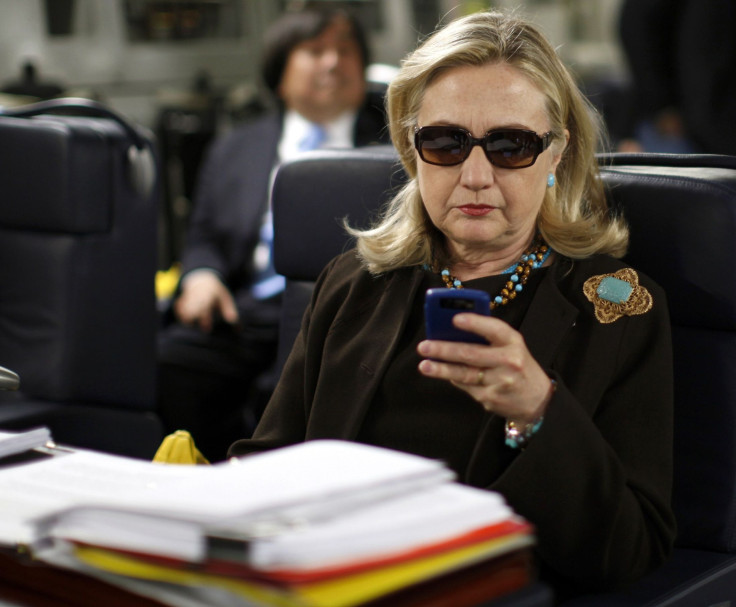Hillary Clinton: Secret Emails Have Political Risks, Reinforce Negative Narrative, GOP Strategists Say

WASHINGTON -- Is Hillary Clinton's use of a personal email server to send digital correspondence while she was secretary of state the kind of transgression that opponents will still be talking about on Election Day, 614 days from now? Can the criticism be distilled into a 30-second ad that resonates with voters?
The disclosure of Clinton's secret emails is rippling through the political world, raising speculation about whether this could tank her presidential aspirations, revive discussions about Benghazi or draw another Democrat into the primaries. To assess the political threat, International Business Times interviewed Republican strategists, veterans of presidential campaigns and those attached to current candidates, offering anonymity in order to free them to speak candidly.
The overwhelming consensus was that unless new information emerges from one of those emails, it will be difficult to explain to voters why the emails matter.
“I don’t think it is a huge deal in and of itself,” said one Republican strategist who is likely to play a role in 2016. “To the extent it builds a narrative of her lack of candor and transparency that already reinforces what people believe, it hurts. Of course, this is all absent some devastating email coming out that was purposely being hid, which I doubt exists.”
Late Wednesday night, Clinton tweeted that she asked the Department of State to release all of her emails. Her surprise announcement came after the House Select Committee on Benghazi issued subpoenas for all of the personal emails that relate to Libya. Surprise discoveries remain a possibility.
I want the public to see my email. I asked State to release them. They said they will review them for release as soon as possible.
— Hillary Clinton (@HillaryClinton) March 5, 2015“The problem with a story like this is the shoes that haven’t dropped yet,” another Republican strategist said. “Were there others in her inner circle that benefited from the same privileges? What were the motivations? Was she conducting foreign policy or soliciting donations to the Clinton Foundation and the Clinton Global Initiative, etc.”
But even as they played down the email revelations, Republicans working on campaigns across the party's ideological spectrum still seemed to be reading from the same 'How To Run Against Hillary' playbook. All argued that the email story feeds a larger narrative: The Clintons see themselves as above the rules (foreign donations to the Clinton Foundation, Whitewater); the couple is out of touch with the middle class (expensive speaking fees from wealthy corporations); and Hillary is just like the rest of the Washington political class.
People will pay attention to the emails because they echo what voters already think about Clinton, said Katie Packer Gage, a Republican strategist and Mitt Romney campaign alumna. “If Barack Obama had made the '47 percent' comment or Rick Santorum had made the '47 percent' comment, it probably wouldn’t have made any news,” she said. The email story will stick because the Clintons are “so highly politically motivated that they’re always working an angle.”
“It’s part of two narratives, that they’re very, very secretive and politically motivated and the other that she’s willing to use really bad judgment in her official life in order to protect herself politically,” Packer Gage added.
It's worth noting that most GOP political hands referred not to "Clinton" but to the “Clinton camp” or "the Clintons," lumping Hillary’s potential negatives with those of her husband. “I think this will continue to be an issue as we head into 2016 because there continually seems to be a new story about ethical issues surrounding the Clinton camp every week,” a Washington, D.C.-based strategist said.
All the Republicans interviewed agreed that the email story would not disrupt the Democratic primary process because Clinton is far ahead of any potential challenger in terms of building an infrastructure or attracting donors.
Some strategists even suggested Clinton might be so secure about her nomination prospects that her own team leaked the email story, trying to get it out of the way before she is vulnerable to new revelations during the general election. (It published on a busy news day and was competing for airtime with Congress.)
“This is them wanting to get it out now before Republicans or anyone else can make it an issue, there is absolutely no doubt in my mind about that,” one presidential campaign veteran said. “These are decently smart people and when they were setting up this account they had to know that this or something like this would happen, which means that the content of those emails and her tone or voice is that bad that they’re willing to take this hit.”
If the emails themselves aren't damaging, they could still be used to build a negative ad. One strategist said: “I would probably use that image of her on the Blackberry that was used widely for memes a while back and put text over it highlighting the foreign donations the Clinton Foundation received while she was in office, highlight the fact that she used a private e-mail while secretary of state, presumably to shield herself from FOIA requests… and then end with the text ‘Conflict of Interest?’”
© Copyright IBTimes 2025. All rights reserved.






















